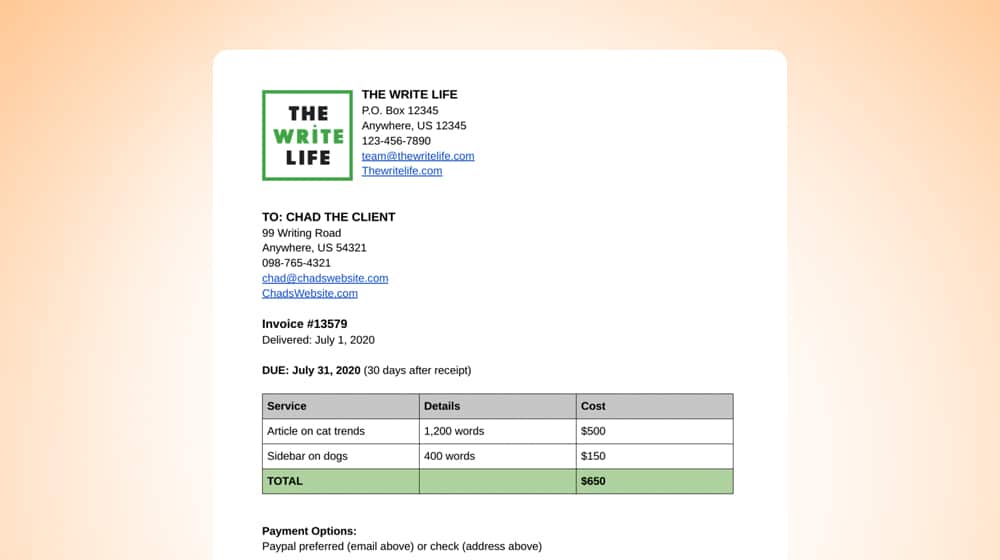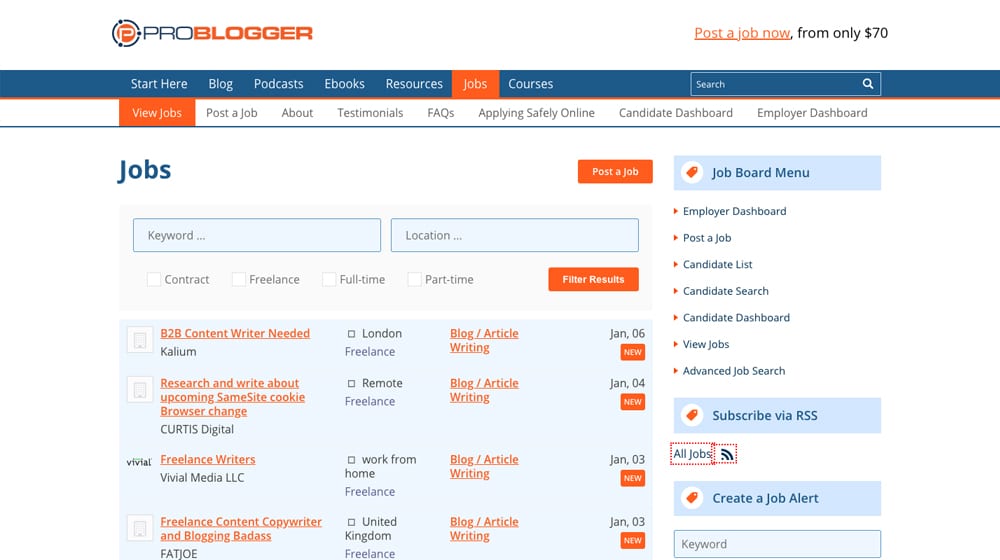Hiring a Blog Manager: Contractor, In-House, or DIY?

Running a blog is a ton of work, as many of you well know. It's no surprise that thousands of blog owners turn to blog managers to do the heavy lifting for them. The question is, what level of manager do you want?
While I've started with the premise of three possible blog manager options in the title, there are actually a few more. You can think of it as a sort of balancing act between two axes: effort and money.
This equation should be familiar to most of you already, from any other level of outsourcing. The more you're willing to do yourself, the less you have to spend to pick up the slack. Conversely, the more you're willing to spend, the less you have to do yourself.
So how do you decide what level of blog management is right for you? Well, first of all, you need to figure out just how much work you want done for you versus how much work you're willing to do. Then you have to determine your budget – and I'll talk a bit about that specifically – and look for blog managers within that range. Then, of course, you can start looking for the right blog manager to work with your company.
 30 Second Summary
30 Second Summary
Blog management requires balancing your own efforts with investments in professional assistance. Depending on your budget and personal involvement, you can choose from a range of aid including freelance writers, in-house blog managers, or full-service blogging agencies. Freelancers offer flexibility and can be less costly, but may require more of your oversight. In-house managers provide stable support and work well as team leaders. Agencies handle every aspect of blog crafting, making them the most hands-off yet expensive option. Choose what suits your operational style and budget.
Balancing the Scales
Blog management can be a lot of work, but it can also be fairly personal. If you're a small business owner and you've spent a long time building up your blog, it can be quite difficult to actually hand over control to someone you barely know. Even if they're part of a company with a great reputation, you still wonder: have I done the right thing here?
Thankfully, you can always maintain some level of control over your blog. Even the most hands-off company will still give you overall creative control and veto power, just to make sure they're doing what you want them to be doing. It makes sense; the alternative is you're unsatisfied and cancel your contract, and they want to keep you as a customer.
So, the first question you have to ask yourself is simple: how much do you want to be involved in managing your blog?
At the low end, you can hire writers.

You still manage all of the details of your blog, like keyword research, topic ideation, meta data optimization, analytics, and media management. The actual act of writing the content, though, you hand off to someone else. This saves you some time, and to be honest, some people find the actual writing to be the most boring part of running a blog. Letting a professional do the legwork at your direction is a great option.
If you want to hand off a little more control, you can hire a blog manager.

A blog manager will take most of that other work off your hands, leaving you with just the top-level creative control. You tell them the overall topics and perspectives you want, and they handle the rest. They may do the writing themselves, or they may have writers they know and work with, or they may want to work with writers you take on as part of your content marketing team. All of these options have different price points, but will generally be more expensive than simply hiring writers.
The most hands-off of all, and the most expensive of all, is to hire a blog management agency.

These agencies will do an interview with you to get your overall guidance, but will otherwise handle your blog from start to finish. You only need to check in with them every few months, or if you happen to notice that they've gone off the rails. These companies often are willing to handle other forms of marketing as well, including social media and PPC, to ensure that all of your content and branding efforts are consistent.
Of course, there are freelancers and companies that fit all levels in between these three categories as well. Often, a contractor or company will be willing to adjust their relationship to have you as a customer, so you can figure out exactly how much creative control you want – and how much work you're willing to do – and tailor a contract from there.
Contractors and Freelancers vs. Employees
For the purposes of most of the rest of this article, I'm going to assume you're not going with a completely outsourced agency. You want to build a team and direct them yourself, not hand the reins over to some other company you barely know. If you DO want to just let someone else handle things for you, there are plenty of options, but a lot of what I'm going to discuss isn't as much of a concern. You can go ahead and skip down to the budget section if you prefer.
When you want to build a team to manage your blog, you have one crucial decision to make. Do you want to hire them as freelancers, or do you want to take them on as full employees?
This decision can be pretty impactful. Not only is the relationship with your team different, you also have to think about things like taxes, regulations, and even payment structures.
If you're considering hiring a freelancer, or several freelancers, you have some decisions to make and some considerations to keep in mind.
Hiring a Freelancer
Before I dig into it, though, I have a quick note to make. The terms "freelancer" and "contractor" are often used interchangeably, and in fact, I'm using them to mean more or less the same thing below. There's a big of a difference, though; a freelancer typically manages themselves and works on numerous projects or clients at a time. A contractor is more likely to work through an agency and focuses on one project at a time. In both cases, though, they're non-employee workers and have similar benefits and drawbacks.

First of all, freelancers are not beholden to you. They are running their own businesses. If managing your blog is a good deal for them, then great! If, however, you end up being too overbearing or difficult to work with, they can cancel the contract at any time. Sometimes, you might find that you just aren't the right fit for a freelancer, and mutually agree to look elsewhere. Sometimes it might blindside you.
Freelancers are also generally working with numerous clients at a time. This applies to writers, blog managers, and most other creative types as well. Freelancers need to diversify their client base, so that if one client chooses to cancel a contract without notice – or even just disappears on them – they aren't completely screwed.
Remember that the life of a freelancer is pretty similar to the life of a small business owner just starting out. The whims of fate, small variations in the economy, or even something like an unexpected injury or expense can topple their business. There will always be some level of uncertainty with a freelancer relationship.
Freelancing is also fraught with peril for the freelancer. Every day, businesses try to take advantage of freelancers by underpaying them, paying them late, or not paying them at all, relying on the fact that a freelancer likely doesn't have the money to take something to court. Even if you have absolutely no intention of doing this, freelancers are a skeptical lot, and protect themselves first and foremost.
While all of this might make it sound like a freelancer is a bad choice, it's not all downsides. There are a number of benefits to picking up freelancers to do your blog management or blog writing.
First of all, freelancers are generally quite skilled and won't require much training. If they're successful enough for you to find them, they probably know what they're doing. Plus, if it turns out that they aren't the right fit, you can drop a contract quickly and easily, unlike an employee relationship.
If you're good to your freelancers, they will be good to you. Because the world of freelancing is so rife with danger, once they find a reliable client, they're likely to stick with you.
We create blog content that converts - not just for ourselves, but for our clients, too.
We pick blog topics like hedge funds pick stocks. Then, we create articles that are 10x better to earn the top spot.
Content marketing has two ingredients - content and marketing. We've earned our black belts in both.
For good or ill, freelancer relationships don't have quite so many regulations around them as an employee relationship. You don't have to worry about things like cutting a contract with cause versus without, or giving them days off, or even thinking about health insurance or other benefits. You also aren't paying taxes for them; all of the burden of tax is on their shoulders.
Note, of course, that I'm speaking in terms of a freelance relationship in the United States. Things are likely different in other countries. Always look into your local laws and regulations.
Speaking of laws and regulations, freelancers can be remote workers, but that can have some impact on how you can work with them. The biggest one right now is California's new gig economy laws. This puts limitations on California-based freelancers and there's a lot of uncertainty on how it's all going to shake out. Trust me, I'll be watching how this unfolds.
Finally, of course, there's the most tangible benefit of all: the cost. Freelancers are almost always going to be cheaper than the employee equivalent.
Hiring an Employee
So what about the employee side of things? Hiring an employee has some benefits, but also some drawbacks.
First, an employee is generally going to be a more stable relationship than a freelancer. While the average length of an employee career has dropped a ton over the last few decades, employees aren't, by default, constantly looking for a new place to work.

Plus, taking action to build employee loyalty – through generous vacation, flexible hours, work from home benefits, good healthcare and retirement options, raises, and so on – means you may be able to keep an employee around a lot longer than average. The current generation expects to be abused by employers, so if you treat them well, they'll be a lot more likely to stick around.
Managing billing for an employee is often less complicated than for a freelancer. Freelancers and contractors may need to send you invoices to be processed on a regular basis, whereas an employee can simply operate with a regular set of hours or even a salary with minimal hassle.
Of course, depending on the number of hours or the salary package you give them, the employee may have extra baggage, like healthcare. Healthcare is in constant flux in America, unfortunately, so there will always be some level of uncertainty and annoyance associated with it.
Thankfully, with a blog manager, you generally don't need to be too strict with things like hours or in-office demands. A blog manager can work perfectly well as a remote position, so long as you have adequate communications channels set up.

Another benefit of an employee team is that you can get a few people together to work as a team as part of your organization, rather than as disparate parts of freelance contracts and the uncertainty of who reports to who. If you hire a blog manager and three writers, for example, it's an easy group to organize, whereas managing freelancers means you may end up being a middleman more often than you'd like.
Which option should you choose? I can't really tell you. For as many pros and cons as there are for each relationship, it really comes down to finding the right person and working with them in the way you both prefer.
Determining Your Budget
Ah, budget. Sooner or later, everything comes down to money in the end, doesn't it? So how do you determine how much of a budget you should spend on a blog manager, either as a contractor or as an employee?
Well, the first thing you can do is start looking up articles that talk about the cost of hiring or contracting someone to handle your blog. There are a ton of different articles about the topic out there, and the general answer is "however much you're willing to pay." The trouble, of course, is that every different level of relationship, responsibility, and contract has a different price point attached.

What I like to do is help people figure out how much money they're already spending on managing their blog. Look for these assorted costs:
- How much are you spending on tools for keyword planning, analytics, social listening, and topic ideation?
- How much are you spending on blog images from stock photo sites, or on paying freelancers for graphic design? Note that this might not change, depending on whether or not the blog manager you hire wants to use your resources or their own.
- How much extra in your budget are you willing to put towards a high quality blog manager?
Then there's one other amount of money you need to consider, and that's the amount of money you're paying yourself.
Remember, your time is money. Every hour you spend on managing your blog is an hour you could be doing something else for your business. How much money are you "spending" on yourself for those hours? That's money you can put towards a blog manager, and make up with other business-boosting actions, like making more sales, researching new products, or visiting trade shows to build relationships.
Calculating all of this will give you a rough estimate of the kind of money you should be able to spend on a blog manager. Obviously, you don't have to spend the full budget on them – and you may have to break it up between a blog manager and a writer or two – but the more you spend, the better quality you're generally going to get.
At this point you also need to decide what kind of billing you're willing to deal with. Do you want to pay a flat fee weekly or monthly for as long as the blog manager is working with you? Do you want to hire them on for a salary and benefits as an employee? Do you want to pay them per blog post published? Do you want to pay them hourly, and trust them to be accurate and adequate with invoicing?

Generally for blog managers, because there's a lot of work that goes into managing a blog that isn't reflected in a per-blog-post rate, hourly, per-project, or employee relationships tend to work the best. Writers are easier to work with for per-post rates.
Finding a Blog Manager
Once you have an idea of all of this, then you can start looking for your ideal blog manager. Depending on the level of service you wanted, the place you look will differ.
If you're looking for an agency to take over, you need look no further than the Google search results for "content marketing agency" and the various alternatives to the term. You can look for an agency local to you, or you can just look for one that's suitably large and well-known enough to trust.

If you're looking for a freelancer or contractor, you can start looking at the usual freelance hubs. Places like Upwork and Freelancer, or specialized job boards where freelancers frequent, like ProBlogger.
If you're looking for an employee, well, then you're looking at setting up a career portal on your site, posting job listings around the internet, and letting them come to you.
Regardless of where you look, finding them is just the first step. Then you have to interview them, test them, and hire the candidate that best suits your needs. Good luck!



 30 Second Summary
30 Second Summary


August 21, 2020 at 1:46 am
When I started my business few years back, I opted to get a freelancer due to budget issues, we were okay and she was able to follow all the ideas that I wanted. The downside is, I can only communicate to her on the time that she sets so if I wanted something to be done ASAP, it's not possible. Now, my business grew and I am happy with my agency who manage my blog.
August 22, 2020 at 6:23 pm
Hi Cody! Thanks for the comment, happy to hear you found a good blog writer 🙂
August 24, 2020 at 12:11 pm
Thanks James, very helpful! I'm trying to manage a blog on the cheap, and doing that while having a high content quality level has been challenging to say the least.
August 24, 2020 at 1:40 pm
Anything is possible! Just make sure you're using tools like Copyscape and Grammarly to check for grammar issues and plaugarized content. Also make sure you're reading each and every blog post from start to finish. The biggest mistake I've seen people make who outsource their blog posts on the cheap is that the articles look good at first glance, but when you read them, they aren't actually addressing the title and topic of the article.
If it just drones on and on and doesn't really give any good actionable advice, or gives common sense advice that isn't very helpful on more advanced subjects, then your content may be hurting more than it's helping. I know too many people who made this mistake and would just glance at the article and thought it looked pretty good, but actually reading it tells a bigger story. If your content isn't legitimately helpful, there's a good chance it's hurting you more than it's helping.
Google's official penalty that you may see is called "Thin content with little or no added value".
Here's a good article we wrote on how to write blog posts that are optimized, without over-doing it: https://www.contentpowered.com/blog/write-seo-friendly-blogs/